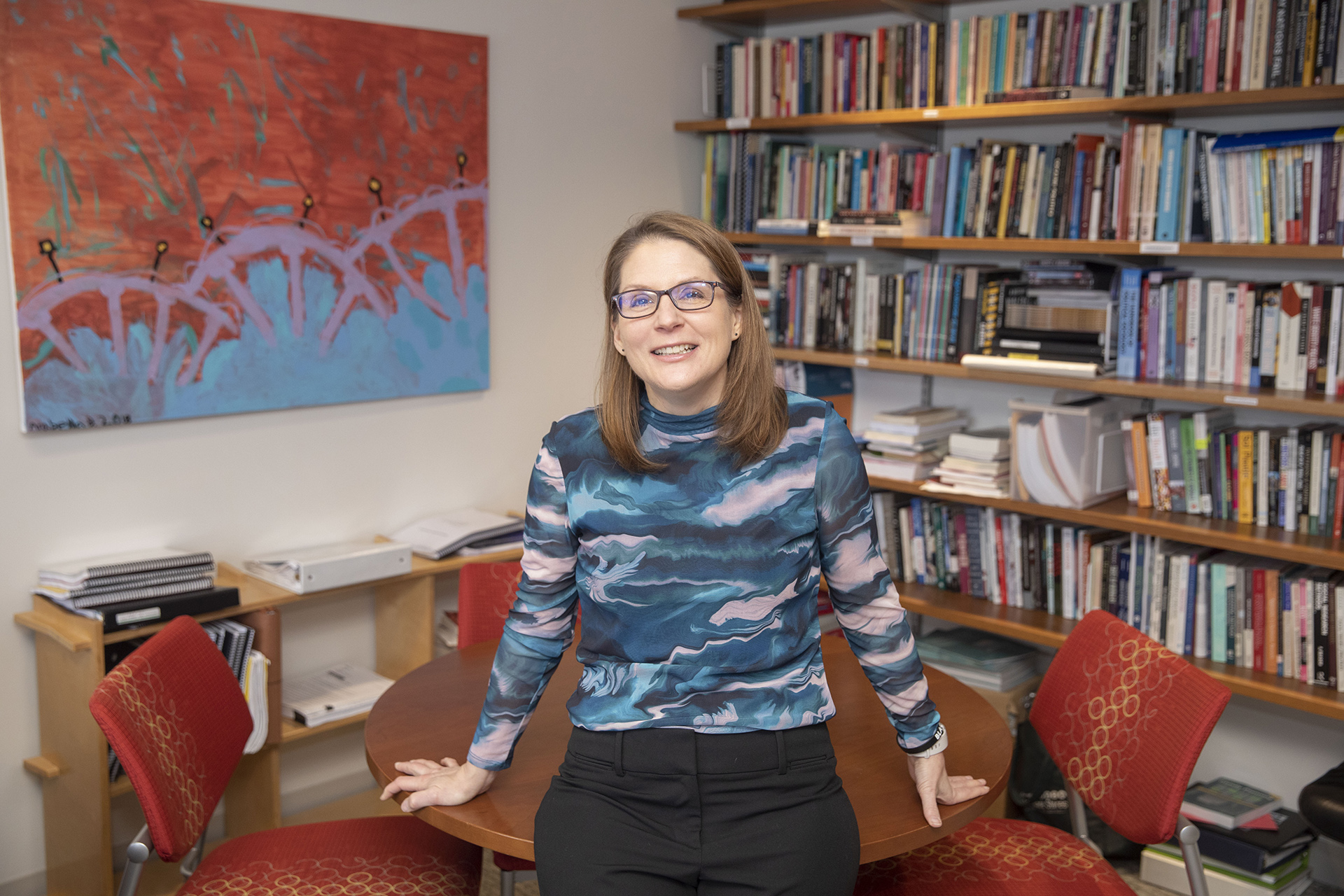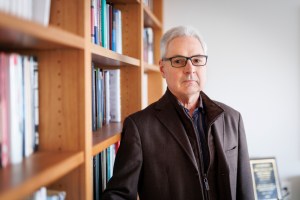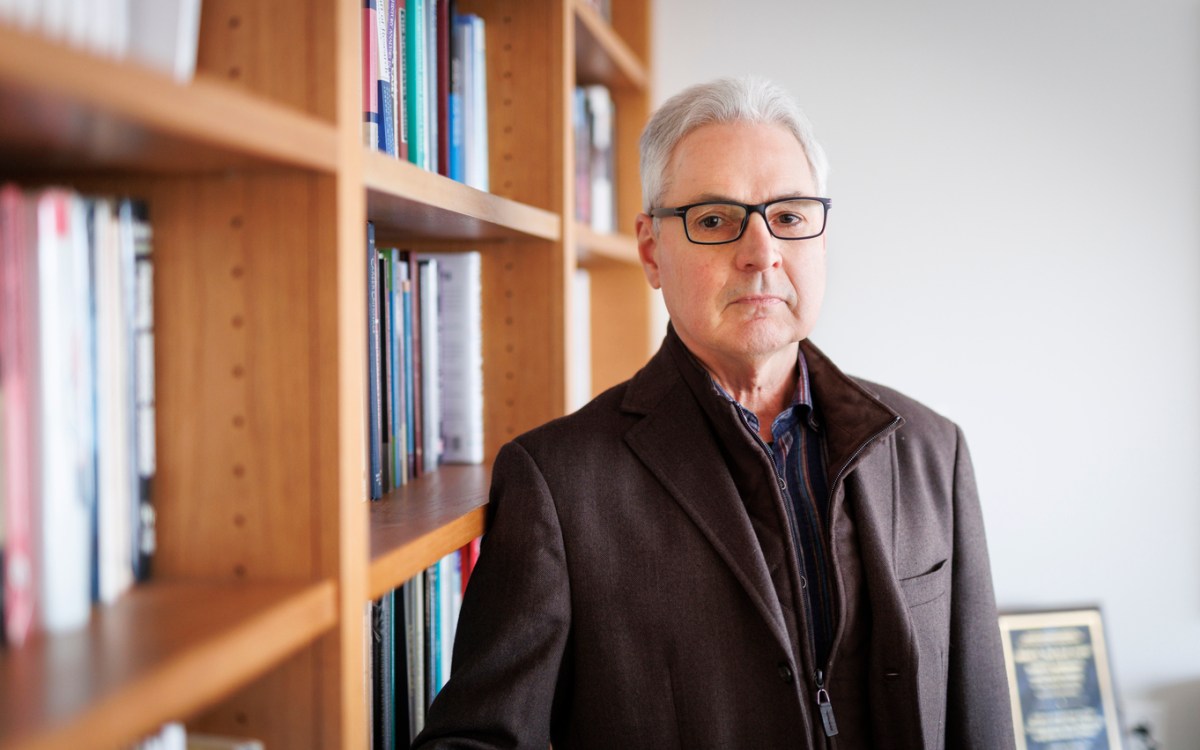
El Salvador President Nayib Bukele during a White House visit last month.
Win McNamee/Getty Images
Closer look at ‘coolest dictator in the world’
Sociologist traces rise, career of Salvadoran leader some view as savior, others as authoritarian
President Nayib Bukele is both widely popular and highly controversial in El Salvador.
But he was less well-known in the U.S. until his visit to the White House in April to underscore his cooperation with the U.S. government’s plan to send some migrants to El Salvador for imprisonment.
Born to a wealthy family of Palestinian ancestry, Bukele has won supporters in El Salvador due to his widespread crackdown on the nation’s powerful criminal gangs with an “iron fist” policy. Critics say he has also trampled constitutional rights and civil liberties and seeks to curtail press freedoms.
In this edited interview, Professor of Sociology Jocelyn Viterna, who has researched El Salvador for over 30 years, spoke about Bukele’s rise to power and her concerns over his methods.

Jocelyn Viterna.
Harvard file photo
Bukele has jokingly referred to himself as the “the coolest dictator in the world.” How do you describe his political ideology?
Before Bukele ran for president in 2019, he had been mayor of a small suburb near San Salvador and then mayor of San Salvador. He identified himself as a left-wing politician who ran on an FMLN (a former rebel group) ticket, but he grew frustrated with the FMLN just like many people in the country.
By the end of his term as mayor of San Salvador, he had become an independent politician. He formed his own party, Nuevas Ideas, and began adopting a populist image — that he was neither right nor left, but something new. Originally, he framed himself as being heavily invested in the development of El Salvador through people, the economy, and especially through tourism. But since 2022, with a crackdown on gang violence in El Salvador, he’s adopted a much more authoritarian identity.
Can you talk a bit more about what that looks like on the ground?
Between Bukele’s controversial second term in 2024, which he accomplished after packing the Supreme Court with loyalists who ruled that he could run despite constitutional limits, and the continuing state of exception, we have seen a complete override of democratic checks and balances. That includes attacks on the media, and his willingness to jail people who oppose his policies or whom he sees as not sufficiently loyal.
People now feel a sense of security; they can go out at night, because Bukele has reduced gang violence in El Salvador. But they are also scared to talk freely. I used to do interviews in El Salvador in the late 1990s and early 2000s, shortly after the civil war, and I never found anyone who wouldn’t talk to me frankly about their political beliefs or what they thought about the government. Now, everyone, from doctors to lawyers to politicians, is afraid of saying anything critical of the government.
What also worries me is that the state of exception, which suspended civil liberties and due process, is leading to a lot of other crimes not being reported. For example, reports suggest that police are increasingly using extra-legal violence, yet nobody reports it because nobody wants to be thrown in jail.
“It’s hard to overstate how frustrated the country was with the two main political parties, with the corruption that both of them engaged in, and especially with the very high rates of violence.”
Bukele has an over 80 percent approval rating in El Salvador. Why is he seemingly so popular?
There’s a number of reasons. First, when Bukele ran for president, many people on the left and the right saw him as someone who represented a way forward, different from a traditional politician. It’s hard to overstate how frustrated the country was with the two main political parties, with the corruption that both of them engaged in, and especially with the very high rates of violence.
The second reason why people love Bukele is that he has reduced both gang violence and murder rates in El Salvador. Gangs used to control large swaths of the country and were very brutal; many people lost their lives, their children, and their properties. Now people have safety, security and freedom from the gang violence that they have not had in over two decades.
And the third reason is that Bukele is a master of publicity. He is very adept at using social media, and he’s passed laws that have reduced the ability of media outlets to speak out against him. When you have that kind of complete control of the narrative, you often paint a picture that helps maintain your popularity.
El Salvador had one of the highest murder rates in the continent due to the violent criminal gangs. How did Bukele manage to control them?
There are a lot of unanswered questions, but what our own U.S. Department of Justice has reported is that early in his first presidency, Bukele engaged in illegal negotiations with the gangs to keep the violence down.
Bukele has denied this, but there is some evidence of his dealings with the gangs. One example is that in March of 2022, the gangs allegedly felt that Bukele was not holding up his end of the negotiations and went on a massive killing spree. They killed 87 people in one weekend — the highest number of people killed in El Salvador since the civil war in a single day.
Some media outlets report that this gave Bukele the impetus to crack down on the gangs; he passed a state of exception that was supposed to last 90 days, and it is now in its third year.
In the sweeps that followed, somewhere between 80,000 and 90,000 additional people were put into prison in El Salvador and Bukele’ s own government said that at least 8,000 innocent people were caught up in those sweeps. Because of the state of exception and lack of due process, it’s unclear whether and how these individuals will get out of jail.
Why is Bukele cooperating with the Trump administration on immigration?
Bukele has thrived on using a policy of “mano dura,” presenting himself as a strong-handed leader who is going to fix problems quickly and effectively and won’t take no for an answer. I think that to have the opportunity to highlight what he’s done in El Salvador from the White House was something that was difficult to resist for him.
What do Salvadorans think about Bukele’s imprisoning deported migrants from the U.S.?
I’ve been surprised at how positive they have been about it, at least in social media. I find this surprising because the Salvadoran diaspora, mostly those living in the United States, is responsible for holding up the economy that Bukele is running.
I’m very bothered by the fact that Bukele, the first Salvadoran president who’s ever gotten invited to the White House, did not take advantage of the opportunity to ask for an extension of TPS [Temporary Protected Status, which allows immigrants from troubled nations to live and work in the U.S.] or a sort of work-exchange program, or even to advocate for the migrants in the U.S., but instead laughed and made jokes about Kilmar Abrego Garcia, who was picked up by mistake by ICE and was sent back to El Salvador.




